Contract Law Case Study: Stan and MacBig Restaurant - BLO1105 Analysis
VerifiedAdded on 2022/11/10
|10
|2318
|219
Case Study
AI Summary
This assignment analyzes a contract law case involving Stan, a customer of MacBig restaurant, and the legal implications of their interactions. The case explores the formation of a contract, including offer, acceptance, and consideration, within the context of MacBig's self-service ordering system. It examines whether a valid contract was established and the obligations of both parties. Furthermore, the assignment investigates the enforceability of an exclusion clause printed on the receipt, considering its impact on MacBig's liability for an injury Stan sustained. The analysis incorporates relevant legal principles, including the Australian Consumer Law, and case precedents like Curtis v Chemical Cleaning Co and Donoghue v Stevenson, to determine the rights and responsibilities of each party. The assignment concludes with a determination of whether the exclusion clause is enforceable and the overall liability of the MacBig restaurant.
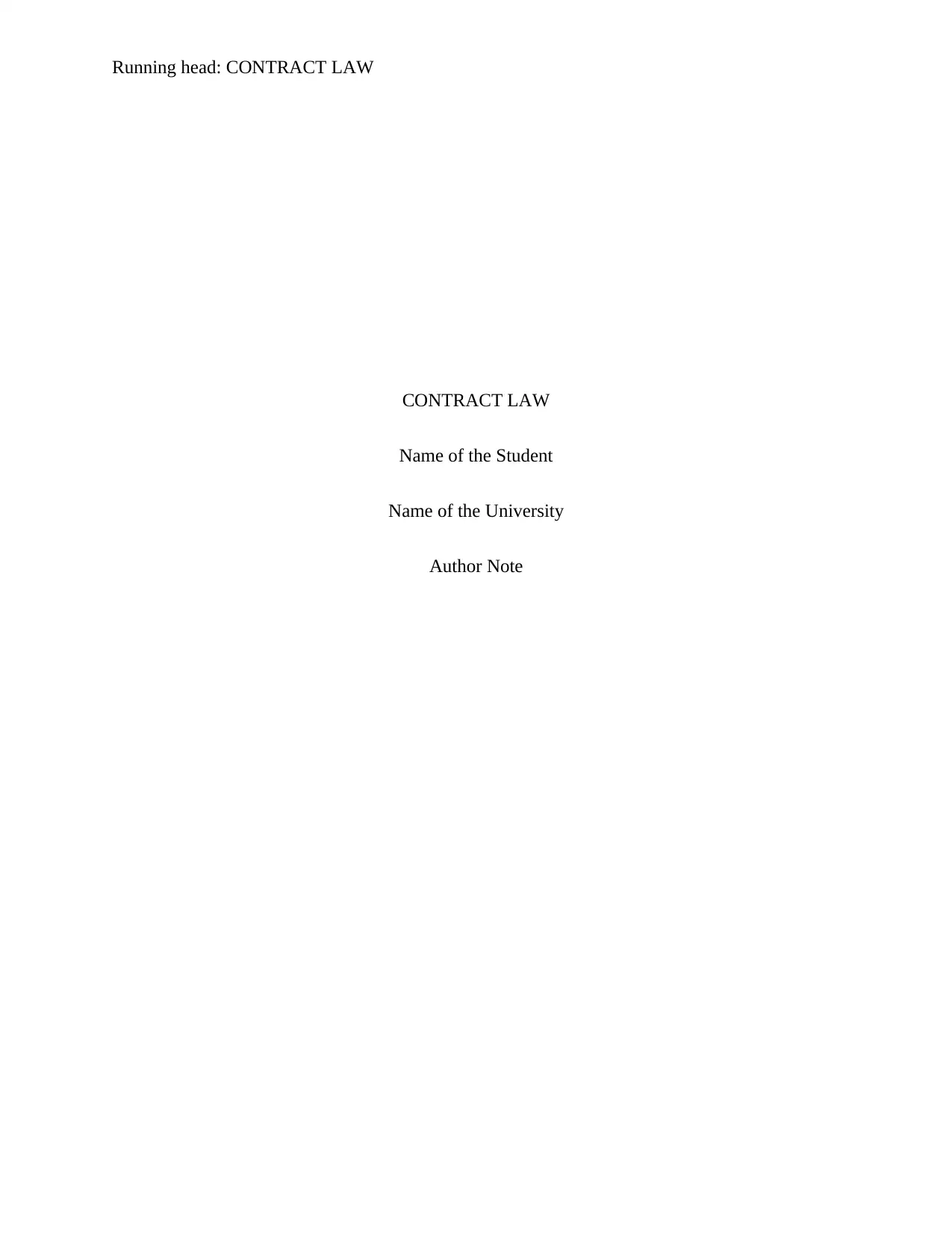
Running head: CONTRACT LAW
CONTRACT LAW
Name of the Student
Name of the University
Author Note
CONTRACT LAW
Name of the Student
Name of the University
Author Note
Paraphrase This Document
Need a fresh take? Get an instant paraphrase of this document with our AI Paraphraser
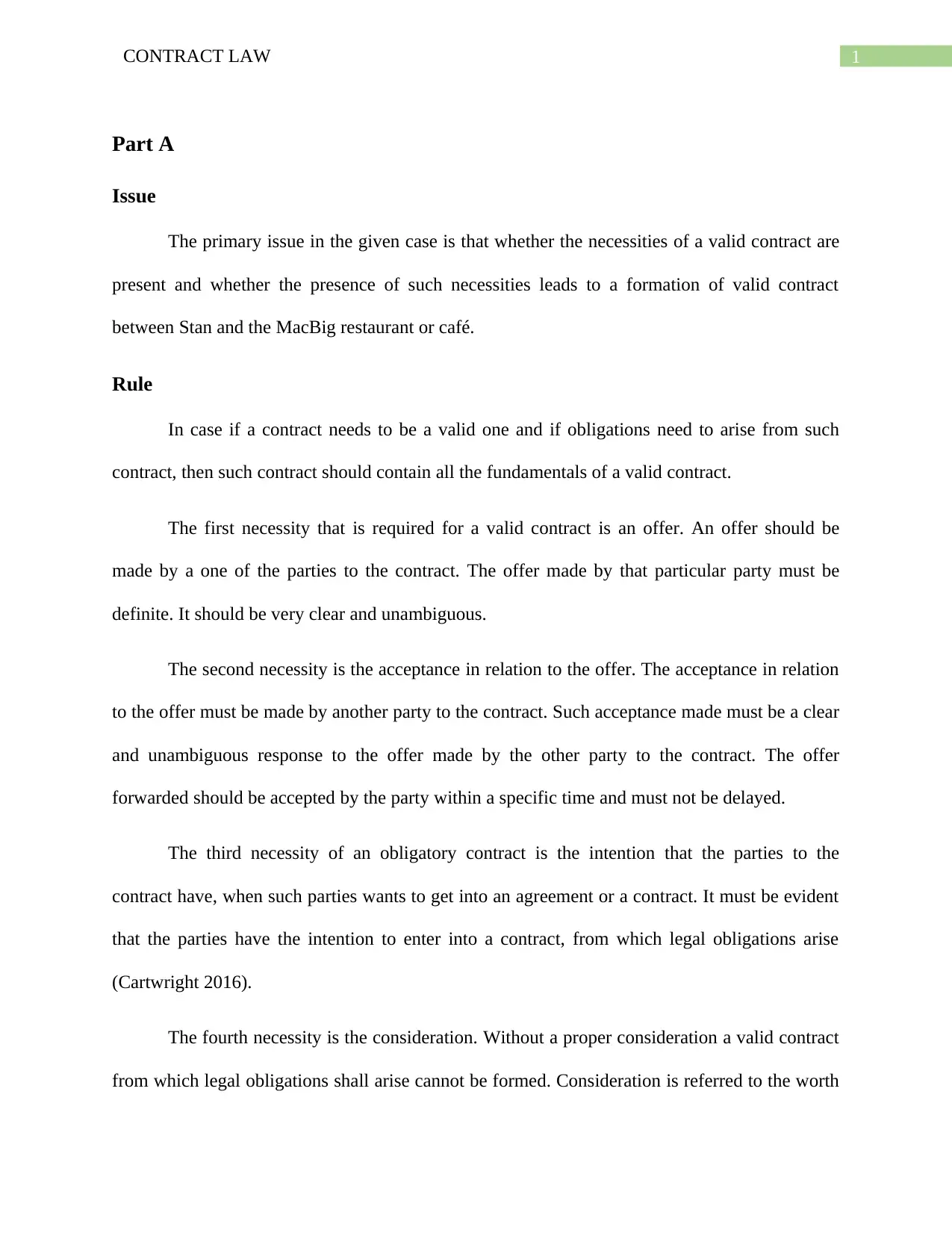
1CONTRACT LAW
Part A
Issue
The primary issue in the given case is that whether the necessities of a valid contract are
present and whether the presence of such necessities leads to a formation of valid contract
between Stan and the MacBig restaurant or café.
Rule
In case if a contract needs to be a valid one and if obligations need to arise from such
contract, then such contract should contain all the fundamentals of a valid contract.
The first necessity that is required for a valid contract is an offer. An offer should be
made by a one of the parties to the contract. The offer made by that particular party must be
definite. It should be very clear and unambiguous.
The second necessity is the acceptance in relation to the offer. The acceptance in relation
to the offer must be made by another party to the contract. Such acceptance made must be a clear
and unambiguous response to the offer made by the other party to the contract. The offer
forwarded should be accepted by the party within a specific time and must not be delayed.
The third necessity of an obligatory contract is the intention that the parties to the
contract have, when such parties wants to get into an agreement or a contract. It must be evident
that the parties have the intention to enter into a contract, from which legal obligations arise
(Cartwright 2016).
The fourth necessity is the consideration. Without a proper consideration a valid contract
from which legal obligations shall arise cannot be formed. Consideration is referred to the worth
Part A
Issue
The primary issue in the given case is that whether the necessities of a valid contract are
present and whether the presence of such necessities leads to a formation of valid contract
between Stan and the MacBig restaurant or café.
Rule
In case if a contract needs to be a valid one and if obligations need to arise from such
contract, then such contract should contain all the fundamentals of a valid contract.
The first necessity that is required for a valid contract is an offer. An offer should be
made by a one of the parties to the contract. The offer made by that particular party must be
definite. It should be very clear and unambiguous.
The second necessity is the acceptance in relation to the offer. The acceptance in relation
to the offer must be made by another party to the contract. Such acceptance made must be a clear
and unambiguous response to the offer made by the other party to the contract. The offer
forwarded should be accepted by the party within a specific time and must not be delayed.
The third necessity of an obligatory contract is the intention that the parties to the
contract have, when such parties wants to get into an agreement or a contract. It must be evident
that the parties have the intention to enter into a contract, from which legal obligations arise
(Cartwright 2016).
The fourth necessity is the consideration. Without a proper consideration a valid contract
from which legal obligations shall arise cannot be formed. Consideration is referred to the worth
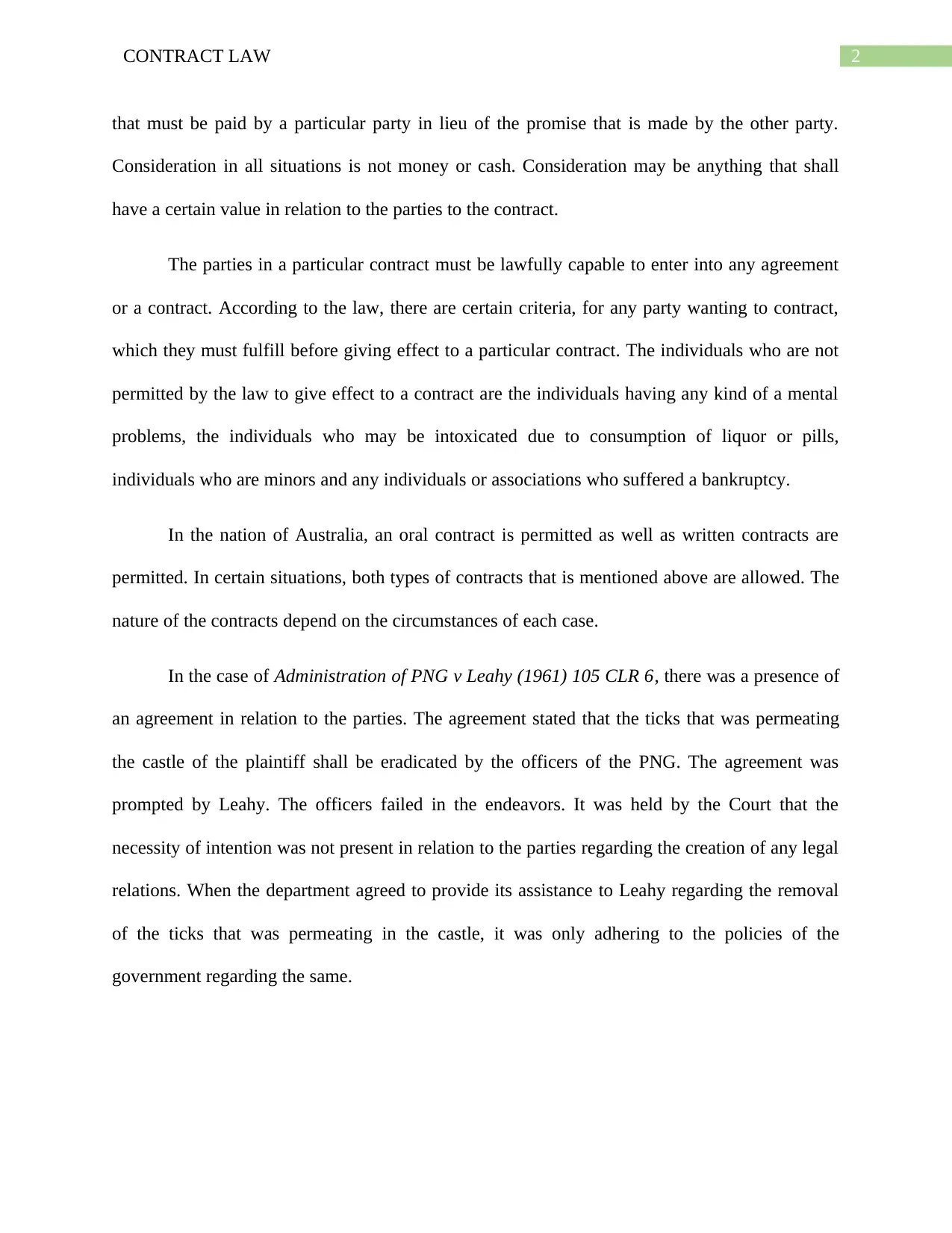
2CONTRACT LAW
that must be paid by a particular party in lieu of the promise that is made by the other party.
Consideration in all situations is not money or cash. Consideration may be anything that shall
have a certain value in relation to the parties to the contract.
The parties in a particular contract must be lawfully capable to enter into any agreement
or a contract. According to the law, there are certain criteria, for any party wanting to contract,
which they must fulfill before giving effect to a particular contract. The individuals who are not
permitted by the law to give effect to a contract are the individuals having any kind of a mental
problems, the individuals who may be intoxicated due to consumption of liquor or pills,
individuals who are minors and any individuals or associations who suffered a bankruptcy.
In the nation of Australia, an oral contract is permitted as well as written contracts are
permitted. In certain situations, both types of contracts that is mentioned above are allowed. The
nature of the contracts depend on the circumstances of each case.
In the case of Administration of PNG v Leahy (1961) 105 CLR 6, there was a presence of
an agreement in relation to the parties. The agreement stated that the ticks that was permeating
the castle of the plaintiff shall be eradicated by the officers of the PNG. The agreement was
prompted by Leahy. The officers failed in the endeavors. It was held by the Court that the
necessity of intention was not present in relation to the parties regarding the creation of any legal
relations. When the department agreed to provide its assistance to Leahy regarding the removal
of the ticks that was permeating in the castle, it was only adhering to the policies of the
government regarding the same.
that must be paid by a particular party in lieu of the promise that is made by the other party.
Consideration in all situations is not money or cash. Consideration may be anything that shall
have a certain value in relation to the parties to the contract.
The parties in a particular contract must be lawfully capable to enter into any agreement
or a contract. According to the law, there are certain criteria, for any party wanting to contract,
which they must fulfill before giving effect to a particular contract. The individuals who are not
permitted by the law to give effect to a contract are the individuals having any kind of a mental
problems, the individuals who may be intoxicated due to consumption of liquor or pills,
individuals who are minors and any individuals or associations who suffered a bankruptcy.
In the nation of Australia, an oral contract is permitted as well as written contracts are
permitted. In certain situations, both types of contracts that is mentioned above are allowed. The
nature of the contracts depend on the circumstances of each case.
In the case of Administration of PNG v Leahy (1961) 105 CLR 6, there was a presence of
an agreement in relation to the parties. The agreement stated that the ticks that was permeating
the castle of the plaintiff shall be eradicated by the officers of the PNG. The agreement was
prompted by Leahy. The officers failed in the endeavors. It was held by the Court that the
necessity of intention was not present in relation to the parties regarding the creation of any legal
relations. When the department agreed to provide its assistance to Leahy regarding the removal
of the ticks that was permeating in the castle, it was only adhering to the policies of the
government regarding the same.
⊘ This is a preview!⊘
Do you want full access?
Subscribe today to unlock all pages.

Trusted by 1+ million students worldwide
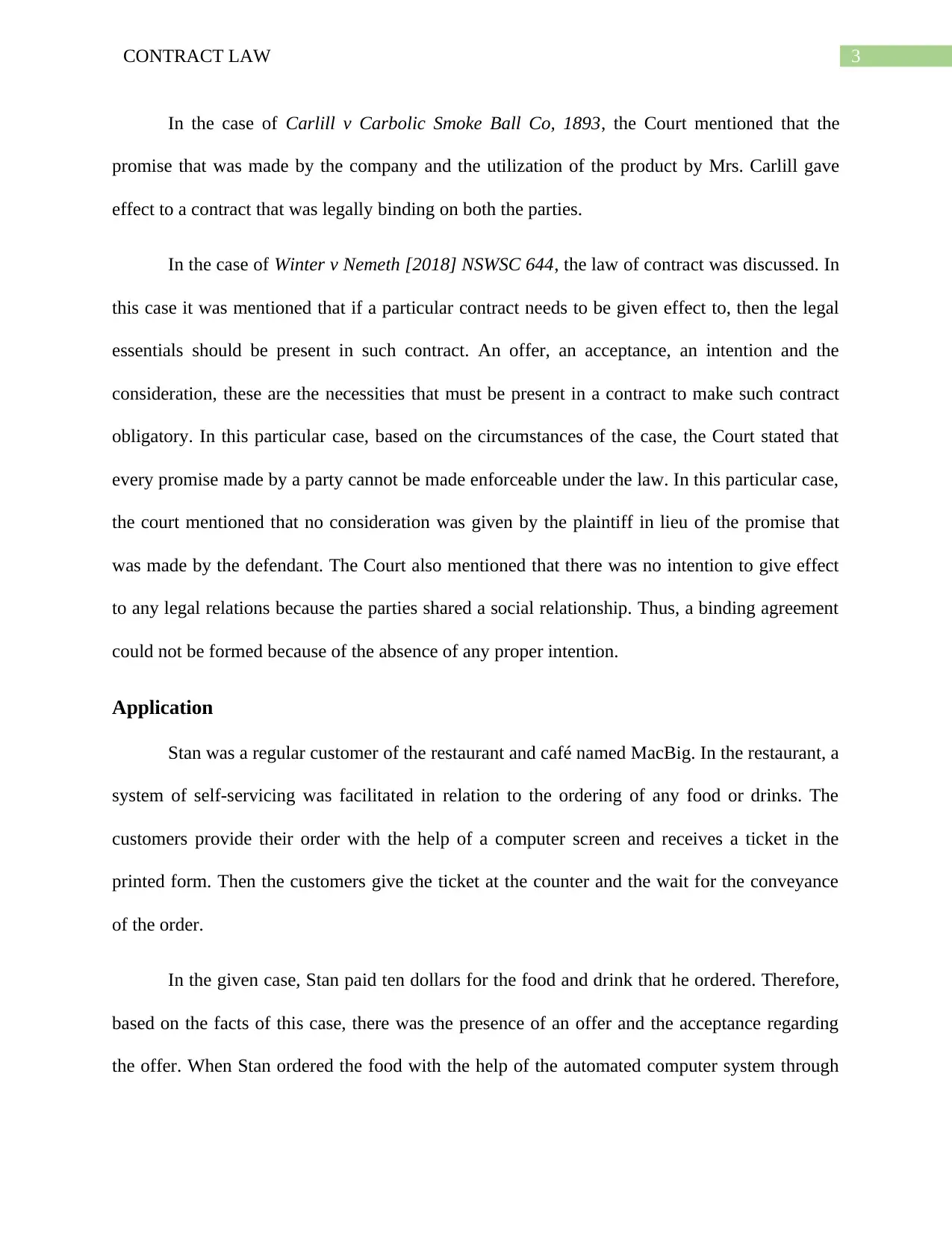
3CONTRACT LAW
In the case of Carlill v Carbolic Smoke Ball Co, 1893, the Court mentioned that the
promise that was made by the company and the utilization of the product by Mrs. Carlill gave
effect to a contract that was legally binding on both the parties.
In the case of Winter v Nemeth [2018] NSWSC 644, the law of contract was discussed. In
this case it was mentioned that if a particular contract needs to be given effect to, then the legal
essentials should be present in such contract. An offer, an acceptance, an intention and the
consideration, these are the necessities that must be present in a contract to make such contract
obligatory. In this particular case, based on the circumstances of the case, the Court stated that
every promise made by a party cannot be made enforceable under the law. In this particular case,
the court mentioned that no consideration was given by the plaintiff in lieu of the promise that
was made by the defendant. The Court also mentioned that there was no intention to give effect
to any legal relations because the parties shared a social relationship. Thus, a binding agreement
could not be formed because of the absence of any proper intention.
Application
Stan was a regular customer of the restaurant and café named MacBig. In the restaurant, a
system of self-servicing was facilitated in relation to the ordering of any food or drinks. The
customers provide their order with the help of a computer screen and receives a ticket in the
printed form. Then the customers give the ticket at the counter and the wait for the conveyance
of the order.
In the given case, Stan paid ten dollars for the food and drink that he ordered. Therefore,
based on the facts of this case, there was the presence of an offer and the acceptance regarding
the offer. When Stan ordered the food with the help of the automated computer system through
In the case of Carlill v Carbolic Smoke Ball Co, 1893, the Court mentioned that the
promise that was made by the company and the utilization of the product by Mrs. Carlill gave
effect to a contract that was legally binding on both the parties.
In the case of Winter v Nemeth [2018] NSWSC 644, the law of contract was discussed. In
this case it was mentioned that if a particular contract needs to be given effect to, then the legal
essentials should be present in such contract. An offer, an acceptance, an intention and the
consideration, these are the necessities that must be present in a contract to make such contract
obligatory. In this particular case, based on the circumstances of the case, the Court stated that
every promise made by a party cannot be made enforceable under the law. In this particular case,
the court mentioned that no consideration was given by the plaintiff in lieu of the promise that
was made by the defendant. The Court also mentioned that there was no intention to give effect
to any legal relations because the parties shared a social relationship. Thus, a binding agreement
could not be formed because of the absence of any proper intention.
Application
Stan was a regular customer of the restaurant and café named MacBig. In the restaurant, a
system of self-servicing was facilitated in relation to the ordering of any food or drinks. The
customers provide their order with the help of a computer screen and receives a ticket in the
printed form. Then the customers give the ticket at the counter and the wait for the conveyance
of the order.
In the given case, Stan paid ten dollars for the food and drink that he ordered. Therefore,
based on the facts of this case, there was the presence of an offer and the acceptance regarding
the offer. When Stan ordered the food with the help of the automated computer system through
Paraphrase This Document
Need a fresh take? Get an instant paraphrase of this document with our AI Paraphraser
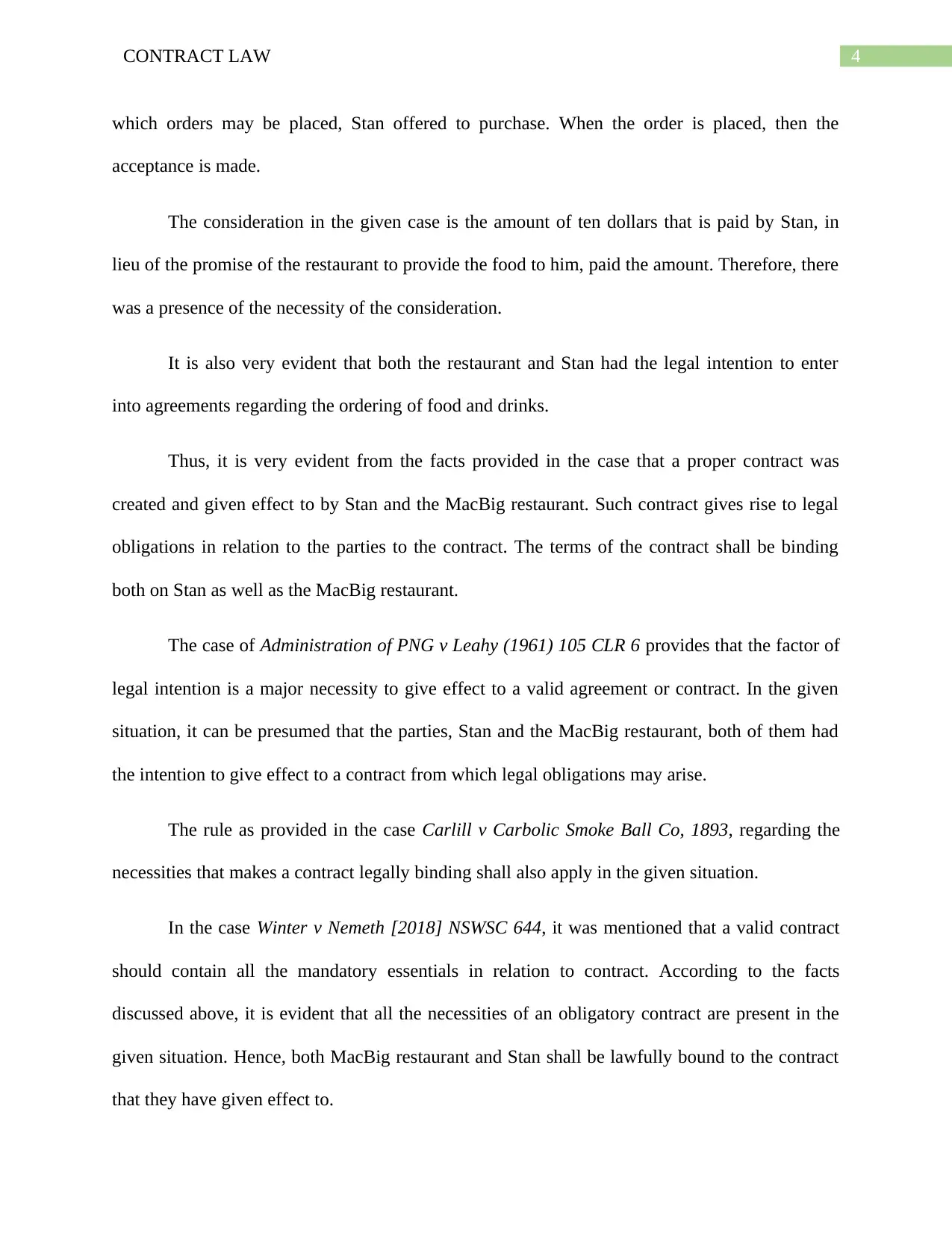
4CONTRACT LAW
which orders may be placed, Stan offered to purchase. When the order is placed, then the
acceptance is made.
The consideration in the given case is the amount of ten dollars that is paid by Stan, in
lieu of the promise of the restaurant to provide the food to him, paid the amount. Therefore, there
was a presence of the necessity of the consideration.
It is also very evident that both the restaurant and Stan had the legal intention to enter
into agreements regarding the ordering of food and drinks.
Thus, it is very evident from the facts provided in the case that a proper contract was
created and given effect to by Stan and the MacBig restaurant. Such contract gives rise to legal
obligations in relation to the parties to the contract. The terms of the contract shall be binding
both on Stan as well as the MacBig restaurant.
The case of Administration of PNG v Leahy (1961) 105 CLR 6 provides that the factor of
legal intention is a major necessity to give effect to a valid agreement or contract. In the given
situation, it can be presumed that the parties, Stan and the MacBig restaurant, both of them had
the intention to give effect to a contract from which legal obligations may arise.
The rule as provided in the case Carlill v Carbolic Smoke Ball Co, 1893, regarding the
necessities that makes a contract legally binding shall also apply in the given situation.
In the case Winter v Nemeth [2018] NSWSC 644, it was mentioned that a valid contract
should contain all the mandatory essentials in relation to contract. According to the facts
discussed above, it is evident that all the necessities of an obligatory contract are present in the
given situation. Hence, both MacBig restaurant and Stan shall be lawfully bound to the contract
that they have given effect to.
which orders may be placed, Stan offered to purchase. When the order is placed, then the
acceptance is made.
The consideration in the given case is the amount of ten dollars that is paid by Stan, in
lieu of the promise of the restaurant to provide the food to him, paid the amount. Therefore, there
was a presence of the necessity of the consideration.
It is also very evident that both the restaurant and Stan had the legal intention to enter
into agreements regarding the ordering of food and drinks.
Thus, it is very evident from the facts provided in the case that a proper contract was
created and given effect to by Stan and the MacBig restaurant. Such contract gives rise to legal
obligations in relation to the parties to the contract. The terms of the contract shall be binding
both on Stan as well as the MacBig restaurant.
The case of Administration of PNG v Leahy (1961) 105 CLR 6 provides that the factor of
legal intention is a major necessity to give effect to a valid agreement or contract. In the given
situation, it can be presumed that the parties, Stan and the MacBig restaurant, both of them had
the intention to give effect to a contract from which legal obligations may arise.
The rule as provided in the case Carlill v Carbolic Smoke Ball Co, 1893, regarding the
necessities that makes a contract legally binding shall also apply in the given situation.
In the case Winter v Nemeth [2018] NSWSC 644, it was mentioned that a valid contract
should contain all the mandatory essentials in relation to contract. According to the facts
discussed above, it is evident that all the necessities of an obligatory contract are present in the
given situation. Hence, both MacBig restaurant and Stan shall be lawfully bound to the contract
that they have given effect to.
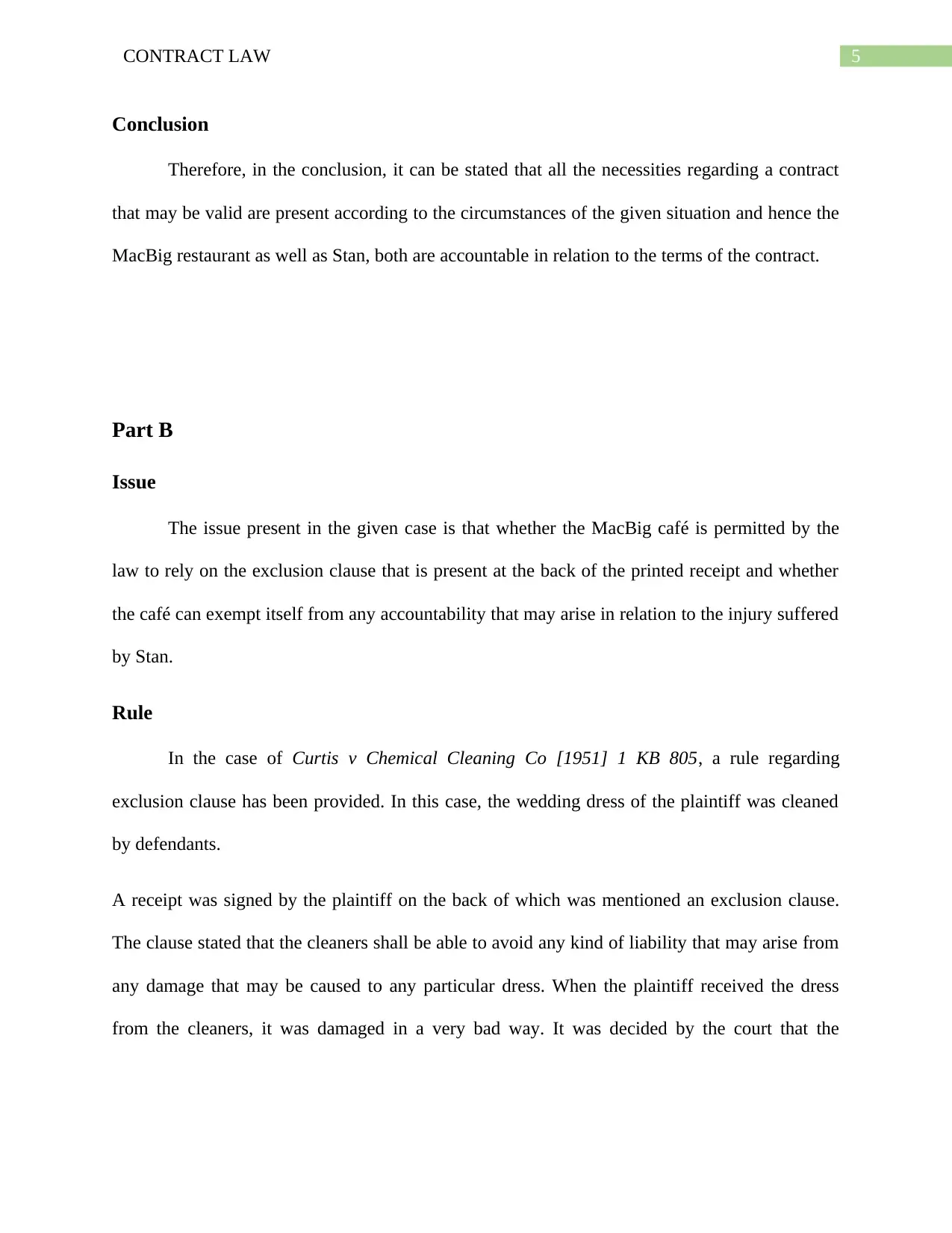
5CONTRACT LAW
Conclusion
Therefore, in the conclusion, it can be stated that all the necessities regarding a contract
that may be valid are present according to the circumstances of the given situation and hence the
MacBig restaurant as well as Stan, both are accountable in relation to the terms of the contract.
Part B
Issue
The issue present in the given case is that whether the MacBig café is permitted by the
law to rely on the exclusion clause that is present at the back of the printed receipt and whether
the café can exempt itself from any accountability that may arise in relation to the injury suffered
by Stan.
Rule
In the case of Curtis v Chemical Cleaning Co [1951] 1 KB 805, a rule regarding
exclusion clause has been provided. In this case, the wedding dress of the plaintiff was cleaned
by defendants.
A receipt was signed by the plaintiff on the back of which was mentioned an exclusion clause.
The clause stated that the cleaners shall be able to avoid any kind of liability that may arise from
any damage that may be caused to any particular dress. When the plaintiff received the dress
from the cleaners, it was damaged in a very bad way. It was decided by the court that the
Conclusion
Therefore, in the conclusion, it can be stated that all the necessities regarding a contract
that may be valid are present according to the circumstances of the given situation and hence the
MacBig restaurant as well as Stan, both are accountable in relation to the terms of the contract.
Part B
Issue
The issue present in the given case is that whether the MacBig café is permitted by the
law to rely on the exclusion clause that is present at the back of the printed receipt and whether
the café can exempt itself from any accountability that may arise in relation to the injury suffered
by Stan.
Rule
In the case of Curtis v Chemical Cleaning Co [1951] 1 KB 805, a rule regarding
exclusion clause has been provided. In this case, the wedding dress of the plaintiff was cleaned
by defendants.
A receipt was signed by the plaintiff on the back of which was mentioned an exclusion clause.
The clause stated that the cleaners shall be able to avoid any kind of liability that may arise from
any damage that may be caused to any particular dress. When the plaintiff received the dress
from the cleaners, it was damaged in a very bad way. It was decided by the court that the
⊘ This is a preview!⊘
Do you want full access?
Subscribe today to unlock all pages.

Trusted by 1+ million students worldwide
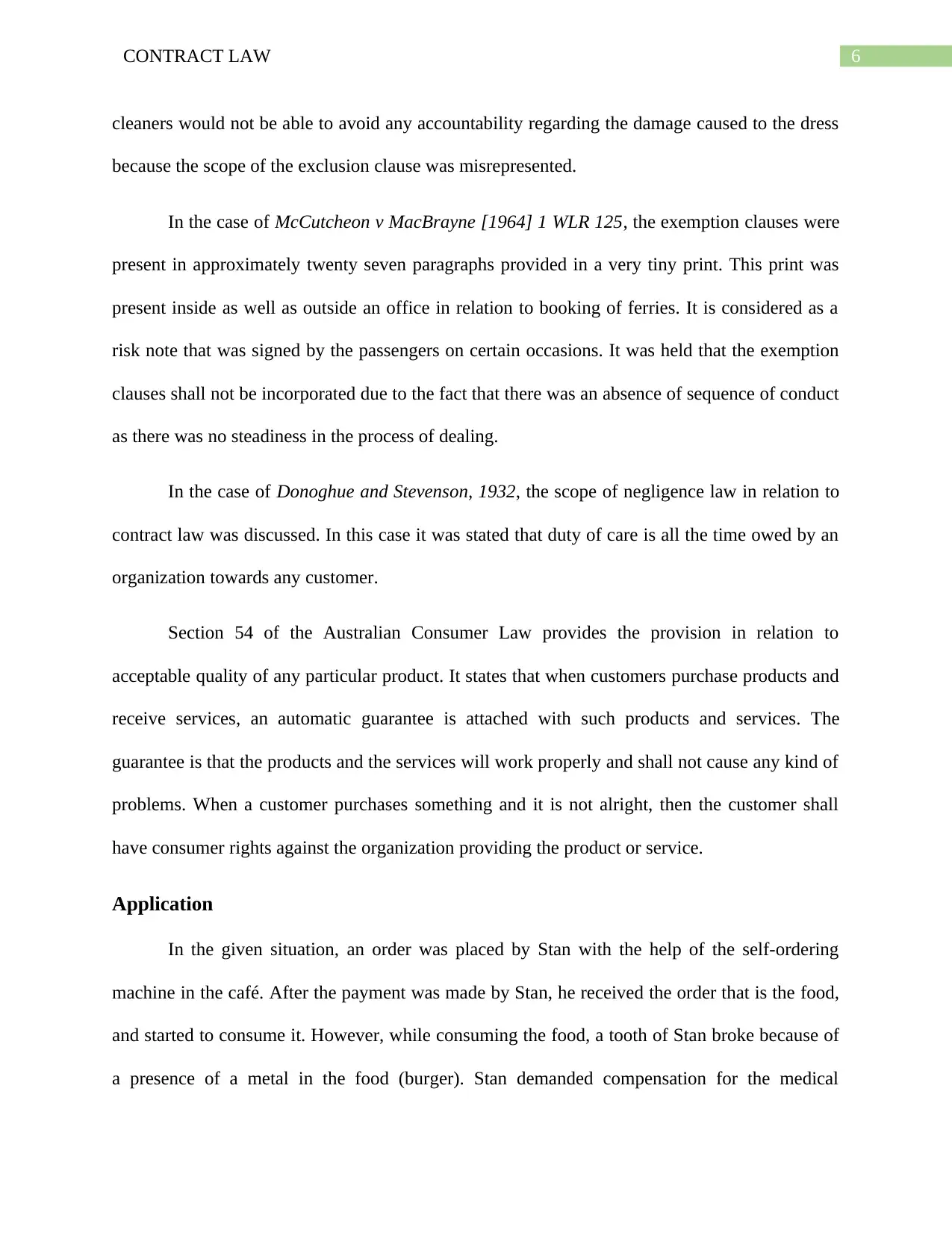
6CONTRACT LAW
cleaners would not be able to avoid any accountability regarding the damage caused to the dress
because the scope of the exclusion clause was misrepresented.
In the case of McCutcheon v MacBrayne [1964] 1 WLR 125, the exemption clauses were
present in approximately twenty seven paragraphs provided in a very tiny print. This print was
present inside as well as outside an office in relation to booking of ferries. It is considered as a
risk note that was signed by the passengers on certain occasions. It was held that the exemption
clauses shall not be incorporated due to the fact that there was an absence of sequence of conduct
as there was no steadiness in the process of dealing.
In the case of Donoghue and Stevenson, 1932, the scope of negligence law in relation to
contract law was discussed. In this case it was stated that duty of care is all the time owed by an
organization towards any customer.
Section 54 of the Australian Consumer Law provides the provision in relation to
acceptable quality of any particular product. It states that when customers purchase products and
receive services, an automatic guarantee is attached with such products and services. The
guarantee is that the products and the services will work properly and shall not cause any kind of
problems. When a customer purchases something and it is not alright, then the customer shall
have consumer rights against the organization providing the product or service.
Application
In the given situation, an order was placed by Stan with the help of the self-ordering
machine in the café. After the payment was made by Stan, he received the order that is the food,
and started to consume it. However, while consuming the food, a tooth of Stan broke because of
a presence of a metal in the food (burger). Stan demanded compensation for the medical
cleaners would not be able to avoid any accountability regarding the damage caused to the dress
because the scope of the exclusion clause was misrepresented.
In the case of McCutcheon v MacBrayne [1964] 1 WLR 125, the exemption clauses were
present in approximately twenty seven paragraphs provided in a very tiny print. This print was
present inside as well as outside an office in relation to booking of ferries. It is considered as a
risk note that was signed by the passengers on certain occasions. It was held that the exemption
clauses shall not be incorporated due to the fact that there was an absence of sequence of conduct
as there was no steadiness in the process of dealing.
In the case of Donoghue and Stevenson, 1932, the scope of negligence law in relation to
contract law was discussed. In this case it was stated that duty of care is all the time owed by an
organization towards any customer.
Section 54 of the Australian Consumer Law provides the provision in relation to
acceptable quality of any particular product. It states that when customers purchase products and
receive services, an automatic guarantee is attached with such products and services. The
guarantee is that the products and the services will work properly and shall not cause any kind of
problems. When a customer purchases something and it is not alright, then the customer shall
have consumer rights against the organization providing the product or service.
Application
In the given situation, an order was placed by Stan with the help of the self-ordering
machine in the café. After the payment was made by Stan, he received the order that is the food,
and started to consume it. However, while consuming the food, a tooth of Stan broke because of
a presence of a metal in the food (burger). Stan demanded compensation for the medical
Paraphrase This Document
Need a fresh take? Get an instant paraphrase of this document with our AI Paraphraser
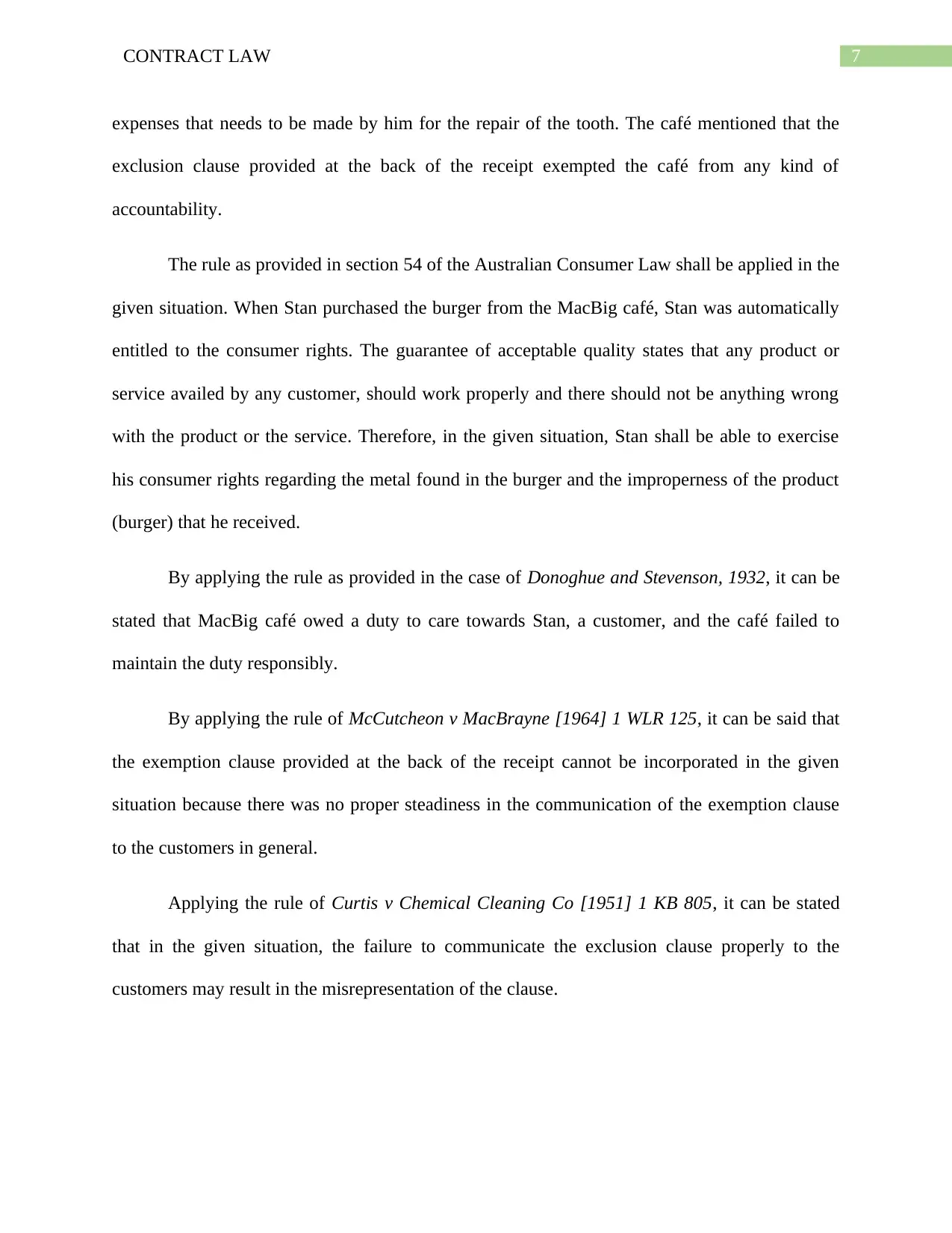
7CONTRACT LAW
expenses that needs to be made by him for the repair of the tooth. The café mentioned that the
exclusion clause provided at the back of the receipt exempted the café from any kind of
accountability.
The rule as provided in section 54 of the Australian Consumer Law shall be applied in the
given situation. When Stan purchased the burger from the MacBig café, Stan was automatically
entitled to the consumer rights. The guarantee of acceptable quality states that any product or
service availed by any customer, should work properly and there should not be anything wrong
with the product or the service. Therefore, in the given situation, Stan shall be able to exercise
his consumer rights regarding the metal found in the burger and the improperness of the product
(burger) that he received.
By applying the rule as provided in the case of Donoghue and Stevenson, 1932, it can be
stated that MacBig café owed a duty to care towards Stan, a customer, and the café failed to
maintain the duty responsibly.
By applying the rule of McCutcheon v MacBrayne [1964] 1 WLR 125, it can be said that
the exemption clause provided at the back of the receipt cannot be incorporated in the given
situation because there was no proper steadiness in the communication of the exemption clause
to the customers in general.
Applying the rule of Curtis v Chemical Cleaning Co [1951] 1 KB 805, it can be stated
that in the given situation, the failure to communicate the exclusion clause properly to the
customers may result in the misrepresentation of the clause.
expenses that needs to be made by him for the repair of the tooth. The café mentioned that the
exclusion clause provided at the back of the receipt exempted the café from any kind of
accountability.
The rule as provided in section 54 of the Australian Consumer Law shall be applied in the
given situation. When Stan purchased the burger from the MacBig café, Stan was automatically
entitled to the consumer rights. The guarantee of acceptable quality states that any product or
service availed by any customer, should work properly and there should not be anything wrong
with the product or the service. Therefore, in the given situation, Stan shall be able to exercise
his consumer rights regarding the metal found in the burger and the improperness of the product
(burger) that he received.
By applying the rule as provided in the case of Donoghue and Stevenson, 1932, it can be
stated that MacBig café owed a duty to care towards Stan, a customer, and the café failed to
maintain the duty responsibly.
By applying the rule of McCutcheon v MacBrayne [1964] 1 WLR 125, it can be said that
the exemption clause provided at the back of the receipt cannot be incorporated in the given
situation because there was no proper steadiness in the communication of the exemption clause
to the customers in general.
Applying the rule of Curtis v Chemical Cleaning Co [1951] 1 KB 805, it can be stated
that in the given situation, the failure to communicate the exclusion clause properly to the
customers may result in the misrepresentation of the clause.

8CONTRACT LAW
Conclusion
To conclude it might be said that MacBig café cannot rely on the exclusion clause and
shall be accountable for the injury caused to Stan.
Conclusion
To conclude it might be said that MacBig café cannot rely on the exclusion clause and
shall be accountable for the injury caused to Stan.
⊘ This is a preview!⊘
Do you want full access?
Subscribe today to unlock all pages.

Trusted by 1+ million students worldwide
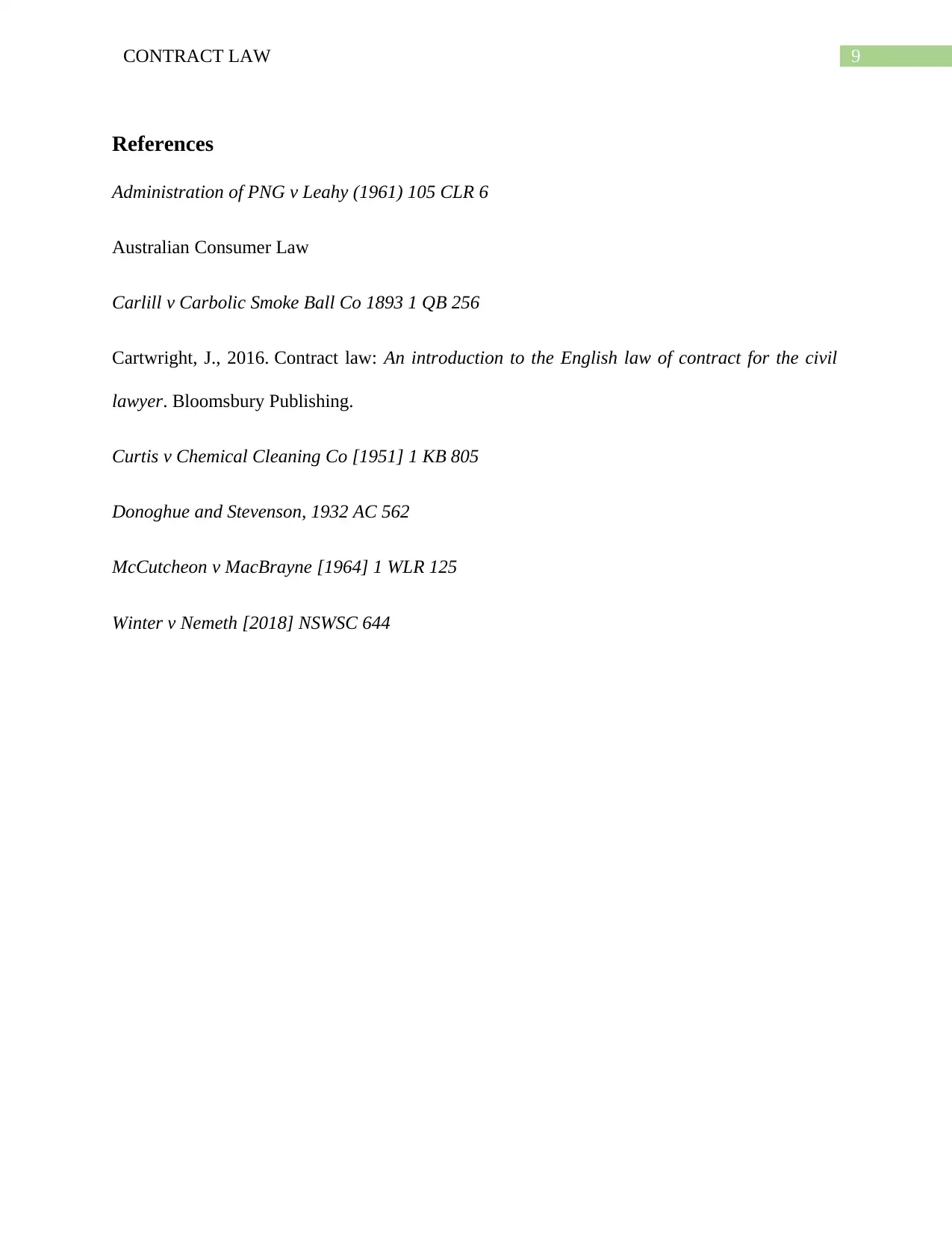
9CONTRACT LAW
References
Administration of PNG v Leahy (1961) 105 CLR 6
Australian Consumer Law
Carlill v Carbolic Smoke Ball Co 1893 1 QB 256
Cartwright, J., 2016. Contract law: An introduction to the English law of contract for the civil
lawyer. Bloomsbury Publishing.
Curtis v Chemical Cleaning Co [1951] 1 KB 805
Donoghue and Stevenson, 1932 AC 562
McCutcheon v MacBrayne [1964] 1 WLR 125
Winter v Nemeth [2018] NSWSC 644
References
Administration of PNG v Leahy (1961) 105 CLR 6
Australian Consumer Law
Carlill v Carbolic Smoke Ball Co 1893 1 QB 256
Cartwright, J., 2016. Contract law: An introduction to the English law of contract for the civil
lawyer. Bloomsbury Publishing.
Curtis v Chemical Cleaning Co [1951] 1 KB 805
Donoghue and Stevenson, 1932 AC 562
McCutcheon v MacBrayne [1964] 1 WLR 125
Winter v Nemeth [2018] NSWSC 644
1 out of 10
Related Documents
Your All-in-One AI-Powered Toolkit for Academic Success.
+13062052269
info@desklib.com
Available 24*7 on WhatsApp / Email
![[object Object]](/_next/static/media/star-bottom.7253800d.svg)
Unlock your academic potential
Copyright © 2020–2026 A2Z Services. All Rights Reserved. Developed and managed by ZUCOL.





